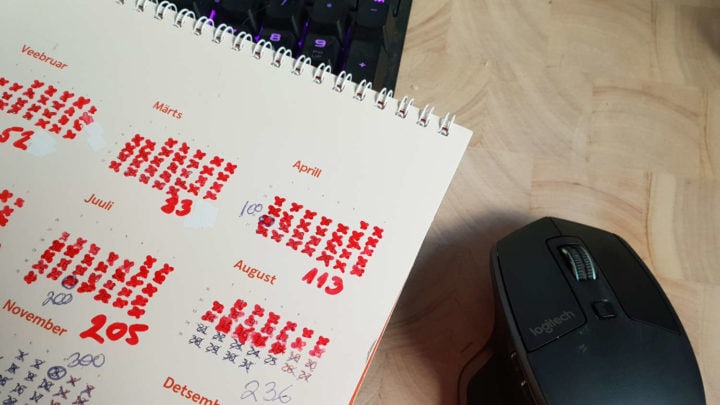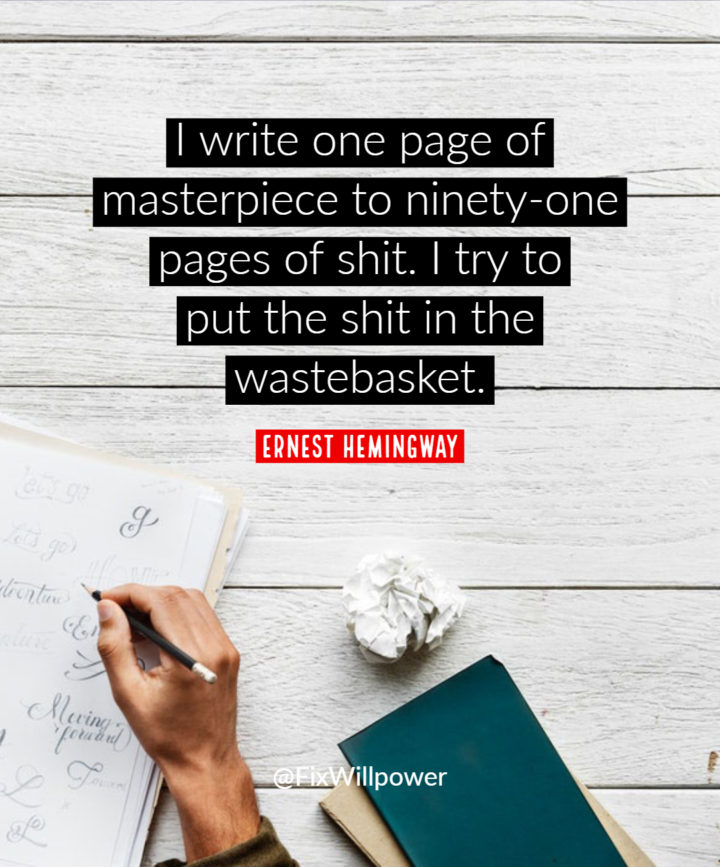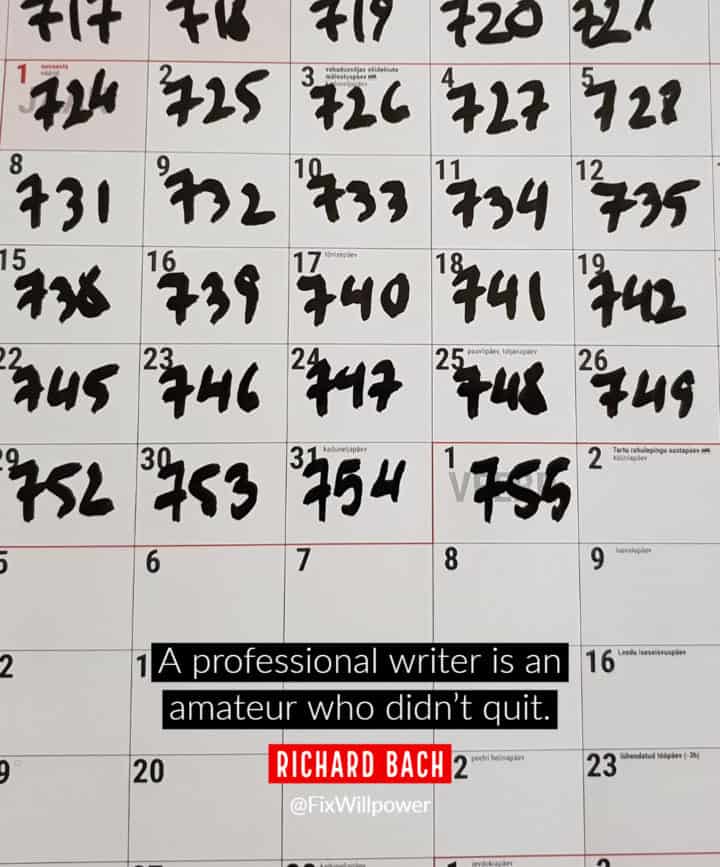Writing challenge helps you improve your mental self?
- More willpower
- Clarity of thought
- Faster thinking and idea generation

You need these qualities to get better results if you work with your head. But you need to train for that. Everybody understands that to bench press 300 pounds, you need to train.
A lot!
For some reason, people don’t believe thinking and willpower need training.
Disclaimer: I make a lot of typos. Using tools to avoid typos helps, but there’s still a lot of errors in my writing. If typos make your day darker, then stop now and read something else.
For everybody else, here’s how you can train your brain and develop a daily writing habit.
The beginning
On January 8, 2017, I decided to write every day. No skipping, no matter what. Now it’s more than 2,600 days later. Right now, typing this sentence, it’s my 2694th day of writing in a row.
The following are the lessons learned while reaching this milestone.

Start writing, no matter what. The water does not flow until the faucet is turned on. ~ Louis L’Amour
Why write daily?
Thinking and presenting my thoughts is the main output of my job. The format is usually written content. Writing is the foundational skill for most people in the knowledge industry. It would be quite hard to get any results if you can’t express yourself well enough.
Writing is hard.
Majority of my colleagues and partners avoid writing; some even hate it.
The first month
The first days and months of writing every day were hard. I didn’t have the daily writing habit, and I had to exert myself to get the words out. Writing 500 words took me about an hour.
However, it wasn’t a new experience. Several years ago, I wanted to know what will happen if I update my blog daily. So, I took on a 30-day writing challenge to publish a 3000 character blog post every day for 30 days.
Journalists and other professional writers create a lot more content every day. But in the beginning, the 500 daily words were hard.
Seinfeld technique
Jerry Seinfeld came up with a tool that helps you keep doing your task every day:
- Get a calendar and a marker.
- Every day after you do your thing, you put a big X on that day.
- You have just one goal, not to break the chain of Xes.
30-day writing challenge
Writing is important.
I wrote down a bunch of ideas from the content marketing and SEO angle. This helps you build the habit and learn about promoting your content. I didn’t want to keep this just for myself and created a 30-day writing challenge.
If you want to build a daily writing habit then, sign up for the challenge and get writing prompts every day.
Putting together the challenge gave me something to write for my 500 words per day willpower exercise.
There are more than a 1000 people who have completed the writing challenge. Some of them have even got back on track with writing a book.
100 Days of Writing
The first big milestone was 100 days of writing. Writing was still as hard as in the beginning. The time for the daily 500 words was about the same as in the beginning.
However, 100 days in a row was an impressive accomplishment. I think I have done nothing in my life for 100 days in a row. Maybe eating and breathing. Well, there was a time when I ran every day for 100 days. But the distances were only 3 to 4 miles per day and didn’t take much effort.
Forgetting the Seinfeld technique
In the middle of June, around the 170th day of writing, I forgot to make the crosses in my calendar. I missed several weeks. I still wrote every day, but didn’t make the crosses in the calendar. Not that important anymore.
The daily writing habit had taken root in my brain. I didn’t need an external tool to remind myself. That was a significant milestone.
When I finally noticed that I had missed several weeks of crosses, I made them all at once. It was like spending the money you just found on the ground. I understood that my brain had accepted the idea that writing is something that will happen every day. No matter what!
Forming a daily writing habit
In the summer, somewhere between half a year and 200 days, the daily writing habit became truly automatic. The writing was still an effort, but less so than in the beginning.
There’s a myth that forming a habit takes 21 days.
No, it doesn’t!
There’s some research that found it took 66 days to form a habit. An example of the habits they tested in this research was walking for 10 minutes after breakfast. For me, the daily writing habit took roughly three times as long… but still, the habit formed.
The marker ran out
Seinfeld suggested that you should use a big red marker to make the crosses in the calendar. I used the marker I had on my desk. The marker ran out on day 223. It felt good to see that my willpower is stronger than a puny pen. I continued making the crosses with a less dramatically red tool. A common ballpoint pen.

100-kilometer run
Day 224 was special. I wrote my 500 words after I had completed a 105.5 kilometer run around lake Võrtsjärv in Estonia. 105.5 kilometers is 2.5 marathons back to back, and it took me 12 hours and 32 minutes.
The day was uncommon in the sense that I usually put my writing session before other large tasks. When I know that the day is tough, I’ll try to do the writing task as the first thing in the morning. So I don’t have to worry about it later.
Not this time!
We started running very early. If I had moved my wake up time to even earlier, then it would have taken out some of the fun from the running. So, I did my writing task after the run.
Writing after an ultra marathon
Approximately 9 pm I finished the lap around the lake. I was pretty tired at that point. I even thought I’d spend the night there because the fatigue was overwhelming. But hot sauna, some rest, water procedures, and a lot of eating improved my mood considerably. I got over the mental fatigue and was left with only physical exhaustion. Even that receded in an hour.
It was time to take out my cell phone and start making notes about the day’s events. After about 200 words, I felt much better. I drove home and finished my 500 words for the day. These 500 words are certainly in the top 3 hardest I have ever written.

Me at the 100-kilometer mark, 11 hours 54 minutes.

Here’s another ultrarunning event where I had to write during the breaks.
The speed of writing and time spent on the task
Around half a year mark the writing speed started to go up. The time you spend on the writing comprises two parts. The most important part is the speed of thought. How fast can your brain come up with the things you want to write about.
The speed of thought depends on how much you need to exert yourself mentally to come up with a meaningful text. If you write about what you see when looking out of the window, then your brain doesn’t have to think very hard. You can get your 500 words on paper two times faster than writing a meaningful article.
The second part of writing is the mechanical skill of pressing the keys on the keyboard. Usually, the typing speed is not very important. But there are situations where you lose a brilliant idea because it took you too long to finish typing the previous thought. If you type faster and make fewer typing errors, then you don’t lose as many ideas to the lack of technical skill.
Practicing typing speed
Even though I have pressed buttons on the keyboard for more than 30 years, I don’t do it very fast. In about 9 months I noticed that my typing speed has become a bottleneck for my writing habit.
A quick search on Google gave me a free touch typing trainer program that had all the features I wanted. For the next month I trained on the program, but limited the time to 20 minutes every day.
After three or four weeks I improved my typing speed more or less 50%. Typing speed has a major impact on the time spent on various tasks that need writing. Writing is most of my work. The goal was to at least double the typing speed and get to the 50 to 70 words per minute level.
The program I use is TypeFaster. It’s an ancient program, and nobody is developing it anymore, so look for something more modern. I use it for historical reasons, having used it years ago when I first wanted to increase my typing speed.
Another point why TypeFaster may appeal to non-English writers is that it has support for multiple languages and keyboard layouts. Even if your language is not supported, like my native Estonian, it’s relatively easy to create your language file.
Meaningful writing
When you create complex original content, then it takes a lot of time. The time it takes you to finish 500 “meaningful” words can be 3 times higher than usual. In cases like that, you mix research, thinking, and writing. The workload needed for original content may stretch your daily 500-word writing exercise well beyond one hour mark.
The key problem is research. If you need the information to complete a sentence or an idea, then you have to research. Switching between writing and research breaks your focus and stops the train of thought.
Separate research from writing.
If you need to check the facts, but the exact information is not essential at the moment, then use a placeholder. After you finish your daily writing exercise, go back to the placeholders and put in the correct information.
I use XXXX as a placeholder because this sequence of letters is easy to find and won’t occur in any regular writing. For example, I write Einstein was born in XXXX. Later I’ll find out the correct year and replace it after I finish writing.
Thinking through writing
One of the most important abilities that daily writing exercise helps to develop is deep thinking. You don’t have to publish everything you write. Writing out the decisions you have to make, helps you make better decisions. Write about:
- why your decision is hard,
- what are the consequences,
- what’s the worst-case scenario,
- what will happen if you don’t decide?
Write down the ideas that come to your head, then go back and elaborate on every idea with one additional thought. Then go back and write something completely opposite. When you do that with 10 to 15 ideas, then you will complete your 500 words and have a clearer picture of your ideas. If you do the idea exercise daily, then you will become an unstoppable idea machine.
When you write about your thinking, then you can jump from topic to topic or go deep on one problem that needs solving. Do it in a way that feels natural to you, and you will improve your thinking process.

Writing, to me, is simply thinking through my fingers. ~ Isaac Asimov
Free-flow writing e.g. Mental vomit
Mental vomit or stream of consciousness writing (or freewriting) is when you write whatever comes to your mind. It is really easy to do. You always have some thoughts in your head. Write it down. Then you have another thought. Write it down. Continue until you have 500 words. The speed of writing mental vomit depends on your typing speed.
Free-flow writing is the fastest writing you can do.
The most radical form of mental vomit is counting numbers in writing. One two three four five six seven eight nine ten eleven twelve… At some point, your brain will say enough of this and starts to come up with something better to write.
Why write mental vomit?
Why and when to write mental vomit?
The number one reason for me to write a stream of consciousness was exhaustion.
After a 10+ hour workday, then it’s pretty hard to take another 30 to 60 minutes to complete your daily writing exercise. In these cases, it’s convenient to write what comes to mind at the moment. The speed of free-flow writing ensures that the writing exercise won’t take up too much of your time.
Is there any value in mental vomit? The most important result is building your willpower and not breaking your challenge. If you don’t miss a day, then your brain learns that you need to do it and you will do it every single day.
Another reason to write random thoughts is that at some point you will settle on a certain theme. Usually, it takes 100 and 150 words. You get to the point where your writing makes sense and may even be worth publishing. You will end up with about two-thirds of your material being usable.
Over time, you notice that you have fewer mental vomit days. You will have no problem opening your text editor and writing 500 to 1000 words of meaningful text in an hour. Sure, this material needs editing later, but it leaves you with about 70% of usable content.
But your daily mental exercise will make you stronger.
A little more meaningful exercise would be a 30 day journal challenge. If you just write what you did and how you felt the day before, you will hit 500 words in no time.
Writing for money
The main reason for the writing challenge was the fact that most of my professional output is in written format:
- essay writing
- technical writing
- creative writing
- freelance writing
- article writing
- writing for websites
The result can be an article, e-book, ad copy, or any other content that starts in a written form.
I started writing for my own company. After about 150 days of writing, I started to accept paid writing gigs.
Building a writing habit and writing for money at the same time is essentially free money. I have to write anyway.
Before the writing exercise, I was afraid to take on writing gigs.
“How the hell am I going to finish that?”
Now the situation was completely different. I would write anyway. So, if someone pays for building my willpower, awesome!
In total, I invoiced my clients for more money than the average salary for a year in my country. But I spent around 15% of my total work time on these tasks.

It’s none of their business that you have to learn to write. Let them think you were born that way. ~ Ernest Hemingway
Writing when drunk
I don’t write well when I’m drunk.
Although there’s a Hemingway quote “Write drunk, edit sober”, it’s probably not true. Hemingway wrote mostly in the morning and that was a bit early to start drinking.
When you write every day for a year or more, then the day will come when you have to write drunk. (If you consume alcohol.) You push your writing later into the day, and then you go out for one drink and get back after many more drinks. You still have to do your writing.
The most colorful situation for me was when I wrote after a lot of wine in a hotel room at 1 am. I decided not to fix the typos even when I noticed them. The result was awful, some of the text was totally incomprehensible. I don’t have an example to put here as the original was in Estonian and wouldn’t make sense to you, anyway.
Editing your writing
The Hemingway quote brought me to editing.
Always edit your writing. Your content will be better if you edit it later.
One of the most valuable things you can do is to come back to your material after 24 hours and edit it. When you write longer pieces that take days or weeks to complete, then edit before your daily writing session to get back on track. Reviewing and editing previous material helps you get up to speed. Continue writing right after you finish editing.
One guy in the Tim Ferriss’ book “Tools of titans” said that you should edit three times
- first for yourself,
- second for your fans, and
- third for the haters.
Here’s my take on this:
Edit for yourself in a way that makes the thoughts clearer and writing more concise. Cut everything mercilessly and make your content compact.
When editing for fans emphasize the points they love and make them happy.
For haters, fact check, spell check, answer the questions they will most likely whine about. Think about the comments haters may make and write the replies in advance.
Editing is awful!
You put in the hours to pound your thoughts out of the keyboard, and now you have to cut it. The primary activity in editing is deleting. Use an idea that I heard in a course I took on Udemy:
If a word can go, it must go! ~ Shani Raja
Another great piece of editing advice came from James Altucher. Delete the first, and last paragraph and your content will be better. It works even if you know that you will use this editing technique.
Everything should be made as simple as possible, but not simpler. ~ Albert Einstein.
Usually, you will edit out or rewrite approximately one-third of your original writing. The exact amount depends on the length of the content and your writing skill.
Hemingway, again, had something to say about that.

I write one page of masterpiece to ninety-one pages of shit. I try to put the shit in the wastebasket. ~ Ernest Hemingway
Spellchecking is not part of editing!
Of course, if you notice a typo, fix it. Use spellcheckers and grammar tools to make sure that your writing would be error-free. There are a ton of tools available in English. I use Grammarly and Word’s built-in spellchecker.
Use the tools!
Even with these tools, some mistakes escape your notice. Don’t worry about that! There are many people who can fix your commas and spelling. Your focus should be on the content and value you deliver with it.

You can always edit a bad page. You can’t edit a blank page. ~ Jodi Picoult
Publishing your content
Should you publish what you write?
Yes!
OK, if you are writing a personal diary then you don’t have to publish. When writing for yourself, your progress will be slower. Do you have enough willpower to focus on the hardest parts of your writing?
You can improve your writing faster if you get feedback from readers.
Where to publish your content?
Create a personal blog. Write articles on a topics important to you.
Do you know anything about anything? I, for example, can’t write about building bridges. However, I can write about how I learn about building bridges.
Publish 100 articles per year on a single topic and you will become a dominant authority in that field. You have to know something about the topic.
Take your friend’s company website and fix the existing content. Of course, ask for payment. Whenever possible finance your education with paid gigs.
Use one document for all writing
On the technical side, I have three suggestions.
The first thing I learned when the volume of content grew was to use a single document for everything. You write 500 words every day for a few months and it piles up.
As the number of different documents grows, you lose track of where something is. You may have the same content in separate files because you forgot that you already wrote about that.
Avoid this problem using a single document.
The name of my Word document is 00-random-500-words-02.docx.
- 00 because this will make the file always to be the first in the list.
- Random-500-words, doh!
- 02 because this is my second file. In the beginning, I intended to create many numbered files, but then common sense won, and I started to use only one file.
Second, I use headings in Microsoft Word because they help me navigate the huge 100+ thousand word document. The compact and collapsible headings’ outline in Word makes navigation much easier.
The third thing I learned is backing up your file…
Back Up!!
AUTOMATICALLY!
Back up the file you use for writing. Sign up to a free Dropbox account or some other service where your files are automatically backed up into the cloud. I have a system where all my important data is backed up in two separate locations.
Why do I back up data?
Lessons learned from previous experiences. You can be pretty sure that most people who have not lost important data do not make backups. I know a case where some bastards stole an almost worthless computer that contained someone’s life work.
It wasn’t backed up!
Learn from other people’s mistakes.
This point may be irrelevant when you use cloud services like Google Writer. But even then I suggest you make copies of your files.
Focus!
One extremely important thing is to focus your writing on a single topic.
For example, the shortest Harry Potter book is a bit more than 77 thousand words. The longest is 257 154 words. If you leave some room for editing and rewriting, then you can write that much content in about three years.
Sometimes you feel it’s too hard to focus on a single topic, but focus as much as you can. And sometimes you are tired and need to write free flow mental vomit.
365 days in a row
Everyone can write 500 words for 365 days in a row!
Yes, you can!
It only takes one year.
The beginning may be slow, painful even, but it will get easier and becomes a habit. This habit will be an important part of your life and give you an invaluable skill for the rest of your life.
The amount of text you create during the writing challenge is massive.
183.5 thousand words!
Publish that much content and you can dominate several niches and still have something left over.
All you need is an hour a day.
OK, I simplify the process a bit. It takes time to research, edit, and publish your content. But you can focus on getting results in a single area.
Competition?
What competition?

A professional writer is an amateur who didn’t quit. ~ Richard Bach
Less than 1% of the readers of this article will reach the 365-day mark.
Even fewer people go further.
The commitment needed to keep going weeds out most of those who start. When you commit you will get results and there’s not much competition.
That was 1 year. In January I crossed the 7-year mark. Now I’m past 2,600 days.
Thanks for reading.
Share this post with someone who would benefit from it.
___________________________
Cover image AnnieSpratt

![Read more about the article Indoor Marathon [167 laps]: Why Cut Corners? To Run Faster!](https://fixwillpower.com/wp-content/uploads/tondiraba-indoor-marathon-429x314.jpg)
![Read more about the article How to Stop Multitasking and 2X Your Productivity [in 2024]](https://fixwillpower.com/wp-content/uploads/stop-multitasking-429x314.jpg)
![Read more about the article Why and How to Write a Thank-You Letter? [4 STEPS]](https://fixwillpower.com/wp-content/uploads/thank-you-letter-429x314.jpg)
I really love how detailed you were with the information you shared. Thank you so much for this post. I hope to kickstart the 30 days challenge from today.
Please, can you send the link to the challenge again. I tried accessing the one in the post but it’s not available anymore
Thanks. Sent
Thanks a lot, it was very inspiring!
Writing has never been a problem for me if it is with pen and to my diary. Computer and keyboard are sort of paralysing me :) So, how to change that thought pattern now that i am actually considering starting a blog..? This awsome 2021 that’s supposed to make a change in your life if you dare to exit the comfort zone..
Thank you for your comment! Start writing just a few lines every day. Maybe 100 words and then scale that up to what ever you feel like.
Hey Priit,
Thanks for the guidelines, it is really hard to keep writing, especially when my head stuck. Anyway, I will follow your tips and start a 30 day writing challenge on my blog https://www.emoovio.com/.
Keep great work.
Thank you for your comment! When you go through the challenge make it as easy as possible. It’s better to write less than none. Make low goal for each day but do not skip.
If you are interested in growing your blog then you could use this course for marketing tips https://fixwillpower.teachable.com/p/30-day-writing-challenge
Thank you for the tips! I started your 30-day writing challenge and now I’m on my third day. I hope I can complete the challenge without skipping a single day. Then maybe even continue to 100 days.
Thank you for joining our challenge. I’m sure you can do it without skipping. Do it as early in the day as possible then the rest of your day will not interfere with your plans. And, of course, keep on writing after you finish the challenge. Writing is a superpower and building a writing habit is a great way to grow yourself.